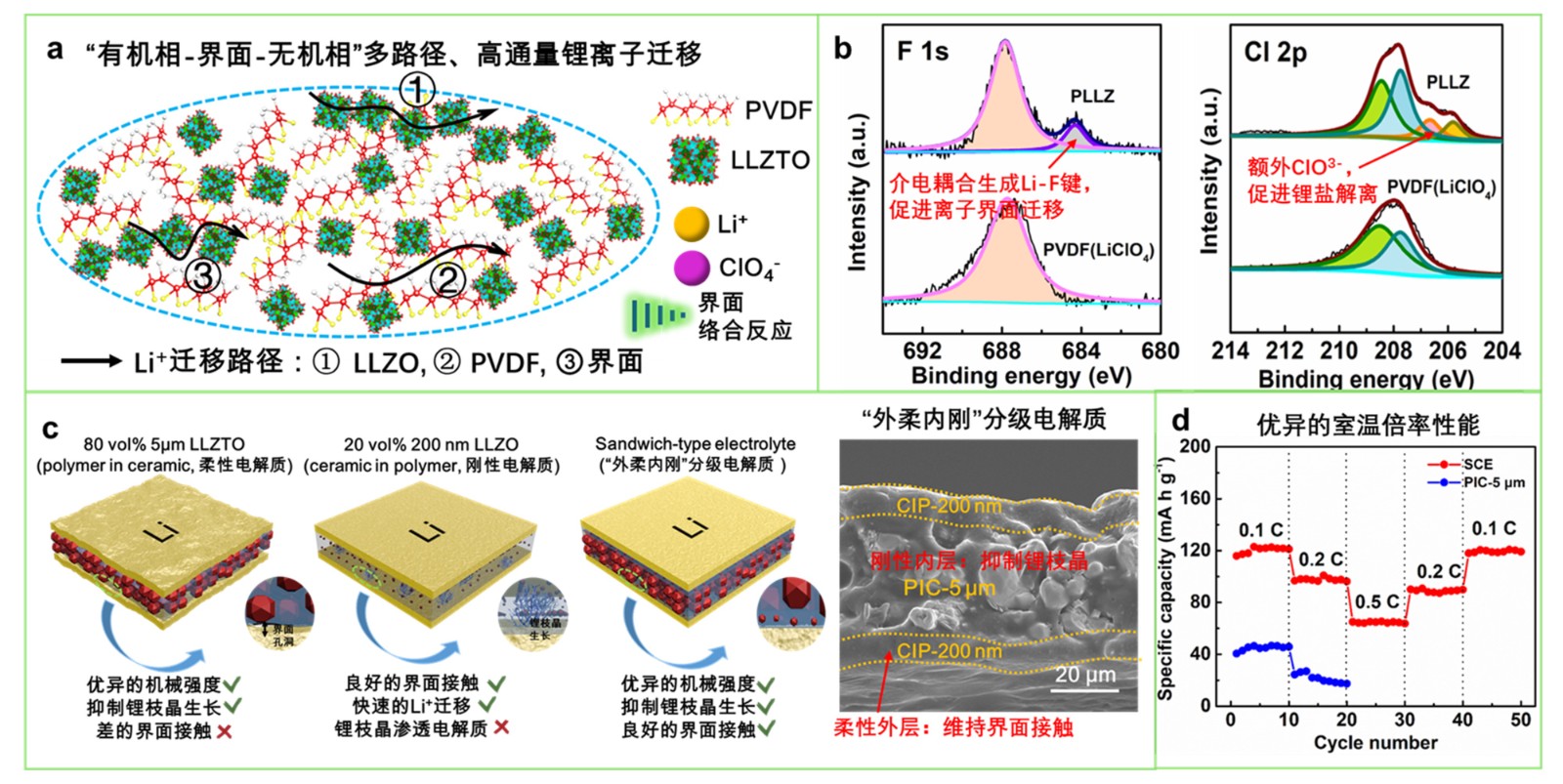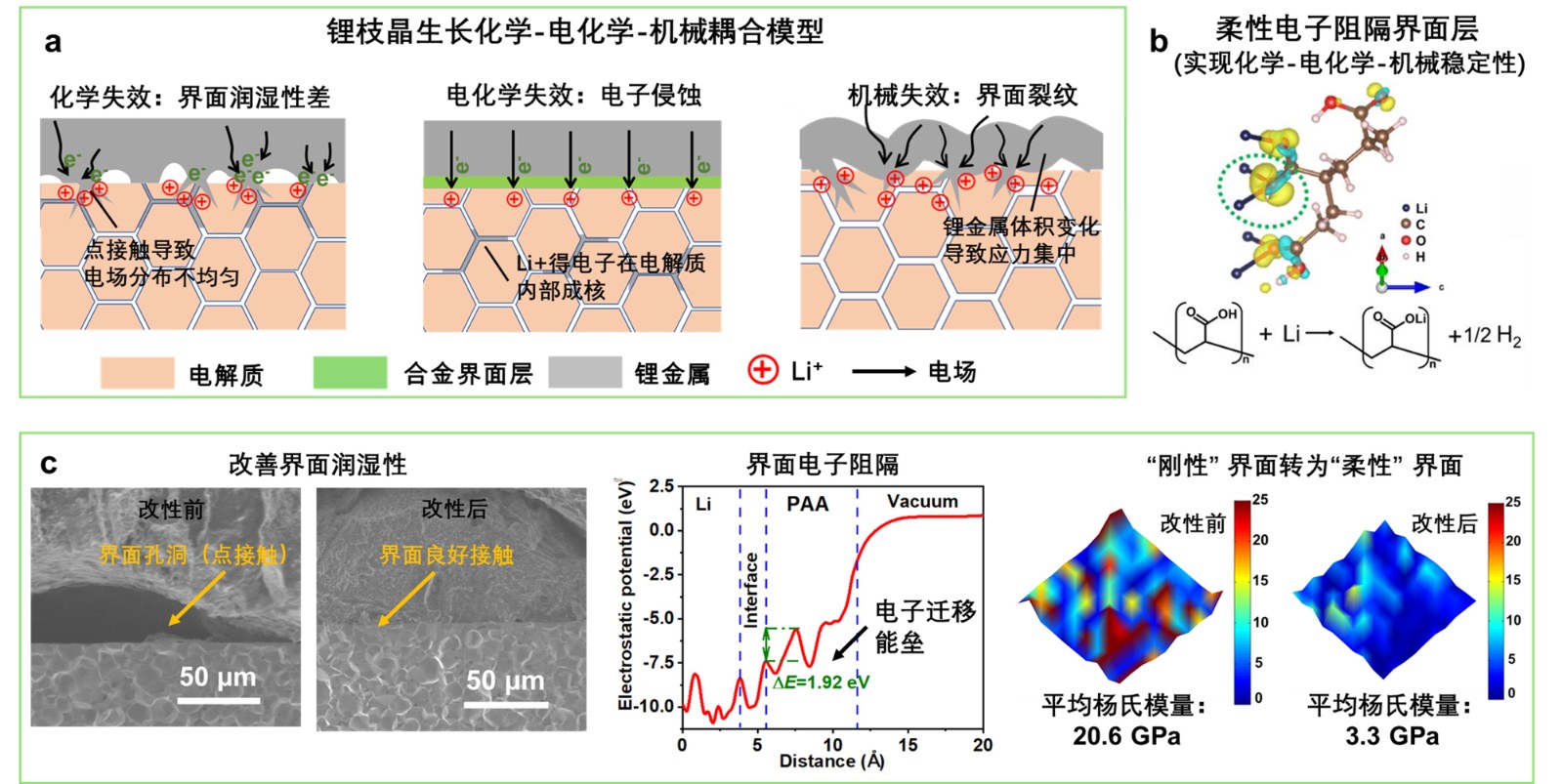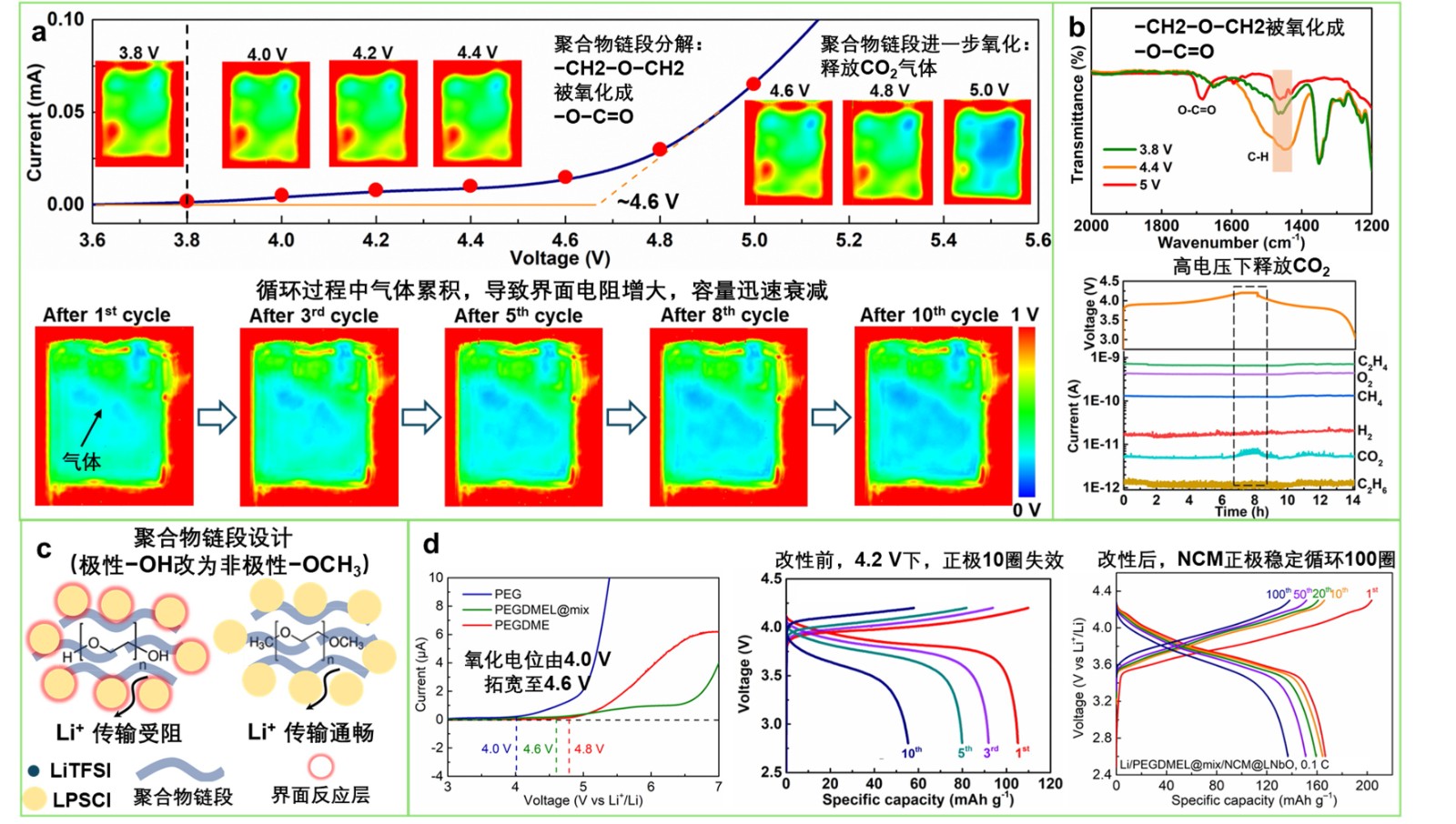Special Professor
Supervisor of Doctorate Candidates
Supervisor of Master's Candidates
Research Direction One: Synthesis of New Solid Electrolytes
This research direction focuses on the design and synthesis of highly stable solid electrolytes. For oxide systems, we developed a Ta-doped LLZO hot-pressing sintering technology that maintains excellent stability against air and lithium metal while achieving ionic conductivity surpassing 10-3 S cm-1. An innovative organic/inorganic Lewis acid-base dynamic complexation strategy was proposed to regulate molecular interfacial interactions between organic phases (e.g., polymers or ionic liquids) and inorganic phases (LLZO, sulfides), constructing a three-dimensional lithium-ion transport network across organic phase-interlayer-inorganic phase interfaces, significantly enhancing the room-temperature ionic conductivity of composite electrolytes. Furthermore, a hierarchically structured composite electrolyte with a flexible outer layer encapsulating a rigid inner core was designed to simultaneously address electrode-electrolyte interfacial contact failure and lithium dendrite penetration challenges. For sulfide/halide systems, we combined high-throughput computational screening (DFT and machine learning), high-entropy composition design, and grain boundary engineering to develop novel superionic conductors with high ionic conductivity (>5 mS cm-1) and wide electrochemical stability windows (>4.6 V), providing advanced electrolyte solutions for all-solid-state batteries.

(1)Hanyu Huo, Jian Gao, Ning Zhao, Dongxing Zhang, Nathaniel Graham Holmes, Xiaona Li, Yipeng Sun, Jiamin Fu, Ruying Li, Xiangxin Guo*, &Xueliang Sun*, Nature communications, 2021, 12.1, 1-10 (ESI highly cited paper).
(2)Hanyu Huo, Jing Luo, Venkataraman Thangadurai, Xiangxin Guo*, Cewen Nan*, Xueliang Sun*, ACS Energy Letters, 2020, 5, 252−262 (ESI highly cited paper).
(3)Hanyu Huo, Yue Chen, Ning Zhao, Ruying Li, Ning Zhao, Jing Luo, João Gustavo Pereira da Silva, Robert Mücke, Payam Kaghazchi, Xiangxin Guo*, Xueliang Sun*, Energy & Environmental Science, 2020, 13,127 (ESI highly cited paper).
(4)Hanyu Huo, Yue Chen, Jing Luo, Xiaofei Yang, Xiangxin Guo*, Xueliang Sun*, Advanced Energy Materials, 2019, 1804004 (ESI hot paper)
Research Direction Two: Study of Chemo-Mechanics
Interfacial chemo-mechanical stability research addresses the critical failure mechanisms of lithium metal and silicon anodes in solid-state batteries. Focusing on dendrite penetration and interfacial degradation, we propose a stability regulation mechanism under multiphysics coupling, transcending conventional single-property optimization by synergizing chemical compatibility, electronic insulation, and mechanical compliance. By designing flexible functionalized interlayers, we significantly enhance interfacial wettability and block electron leakage, enabling uniform lithium deposition and long-term cycling stability. Through multiscale chemical characterization and chemo-mechanical modeling, we elucidate interfacial element interdiffusion, stress accumulation, and fracture evolution in silicon anodes, and develop adaptive interface modification strategies to mitigate parasitic reactions and mechanical mismatch. This work establishes a cross-scale theoretical framework and universal design principles for robust interfaces in high-energy-density solid-state batteries, accelerating the development of safe and efficient energy storage systems.

(1)Hanyu Huo*, Yang Bai, Sebastian Leonard Benz, Timo Weintraut, Shuo Wang, Anja Henss, Dierk Raabe*, Jürgen Janek*, Advanced Materials, 2025, 2415006.
(2)Hanyu Huo*, Ming Jiang, Yang Bai, Shamail Ahmed, Kerstin Volz, Hannah Hartmann, Anja Henss, Chandra Veer Singh, Dierk Raabe*, Jürgen Janek*, Chemo-Mechanical Failure Mechanisms of the Silicon Anode in Solid-State Batteries, Nature Materials, 2024, 23 (4), 543-551.
(3)Hanyu Huo*, Jürgen Janek*, National Science Review, 2023, nwad098.
(4)Hanyu Huo*, Jürgen Janek*, ACS Energy Letters, 2022, 7, 11, 4005–4016.
Research Direction Three: Advanced Characterization
Advanced characterization techniques are pivotal for unraveling interfacial reaction mechanisms and guiding material design in solid-state batteries. To address the ambiguous interfacial evolution between composite electrolytes and cathodes, we developed non-invasive, dynamic in situ monitoring methods. Ultrasonic imaging technology enables real-time, nondestructive observation of interfacial failure processes in solid-state pouch cells, precisely capturing electrolyte decomposition and gas evolution. Coupled with in situ XPS analysis, we elucidated the electronic state reconstruction and interfacial side reactions between polymer segments and sulfide electrolytes. Guided by these insights, we proposed polymer polarity modulation strategies to enhance the oxidative stability and interfacial compatibility of composite electrolytes, enabling their integration with high-voltage cathodes. This research establishes a closed-loop paradigm of "dynamic interface analysis-reaction mechanism modeling-rational material design", accelerating the transition from empirical exploration to mechanism-driven innovation in solid-state battery development.

(1)Hanyu Huo*, Ming Jiang, Boris Mogwitz, Joachim Sann, Yuriy Yusim, Tong-Tong Zuo, Yannik Moryson, Philip Minnmann, Felix H. Richter, Chandra Veer Singh*, Jürgen Janek*, Angewandte Chemie International Edition, 2023, e202218044.
(2)Hanyu Huo, Kai Huang, Wei Luo*, Jintao Meng, Liangyi Zhou, Zhe Deng, Jiayun Wen, Yiming Dai, Zhimei Huang, Yue Shen*, Xiangxin Guo, Xiulei Ji, and Yunhui Huang*, ACS Energy Letters, 2022, 7, 2, 650–658.